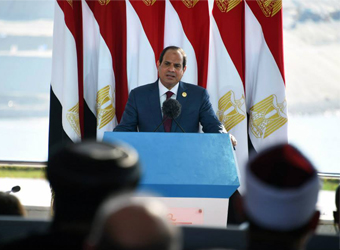The inauguration was attended by Minister of Defence Sedky Sobhy, head of the Suez Canal Authority Mohamed Mamish, Ismailia’s Governor Yasseen Taherand, and Ibrahim Mahlab, the president’s adviser on national development projects.
The East Suez Canal development project, which is part of the larger Suez Canal development plans, was launched in 2015. The project aims to develop major residential and industrial centres in the central Suez Canal governorate of Ismailia.
Ahmed Fouda, the deputy head of the Armed Forces’ engineering authority, which oversaw the projects since their inception in 2015, said the projects were accomplished by several Egyptian companies, including Petrojet, Orascom and Arab Contractors.
The president described the completion of the construction of the tunnels in less than one-and-a-half years, instead of the initial estimate of 12 years, as an achievement.
Fouda said one tunnel in northern Ismailia – connecting Egypt’s northwestern city of Salloum to the vital North Sinai Al-Awja road – is 5,820 metres in length.
He explained that 4,830 metres of the tunnel were constructed through trenchless technology and 990 meters were completed through open cut drilling.
Fouda said that another tunnel in southern Port Said – which connects Salloum to North Sinai’s Rafah – is 3,920 metres-long, with 2,851 metres constructed with trenchless technology and 1,069 metres through open cut drilling.
Fouda said that Suez Canal traffic was not disrupted by the drilling process.
El-Sisi announced during the inauguration speech that the housing ministry has been mandated with implementing a major urban development project that should be finalised within two to three years at a cost of EGP 100 million in North Sinai’s Bir El-Abd, last month’s site of one of the deadliest terrorist attacks in Egypt’s modern history, where gunmen killed 311 people at Al-Rawda Mosque during Friday prayers.
“The more we endure, the more we’ll move forward. Do not believe that success happens without hard work,” Sisi said.
El-Sisi also inaugurated two floating bridges in Ismailia and Qantara, which are named after Ahmed El-Mansi and Abanoub Gerges; two army personnel who were killed in Sinai in the line of duty in recent years.
The president also inspected the Suez Canal Authority’s giant oil service vessel Ahmed Fadel, which is named after the former chairman of the authority.
The Ahmed Fadel vessel is the largest in the region at a length of 90 meters, a width of 18.8 meters, and a capacity of 4,744 tonnes, according to a televised report on the event.
The Egyptian president also inaugurated the second phase of the fish farm project, at an area of 7,500 feddans of saltwater.
According to the report, the fish farm project aims to achieve self sufficiency in the supply of animal protein.
The number of ponds in the second phase is 4,441, which is the continuation of the first phase that started in December 2016.
The new phase comes nearly a year after El-Sisi inaugurated a major fish farming project in the Suez Canal zone governorate of Ismailia in December 2016, in an attempt to narrow the gap between production and consumption.
During his speech, the president promised that by the end of his term in May 2018, he would provide the Egyptian people with a balance sheet of his accomplishments during his time in office.
El-Sisi said that the projects to develop the Suez Canal aim at “allowing us to have a presence on our land in Sinai.”
The president added that the Armed Forces will achieve security in Sinai using the “utmost force.”
“We would rather die than let anyone endanger our land,” Sisi said, adding that Egyptians should not fear any external threat.
The Head of the Suez Canal Authority Mohab Mamish said in a speech at the inauguration that the number of vessels traversing the canal in December 2017 witnessed an increase of 12.2 percent compared to December 2016, with a 15.8 percent increase in revenues in USD and an 11.7 percent increase in Egyptian pounds.
From January 2017 to December 2017, traffic increased 4.6 percent compared to same period last year, with a 5.6 percent increase in revenues in USD and 89.8 percent in Egyptian pounds.
Mamish said that on 9 December, 74 vessels traversed the canal; the highest-ever number of ships to pass through in a single day.
Mamish also said that six new investment contracts have been signed worth $40 billion during November’s World Youth Forum (WYF) in Sharm El-Sheikh, adding that the national economy is being pushed forward by the promotion of foreign investors to visit Egypt as well as the country’s new investment law.
Source: Ahran online
